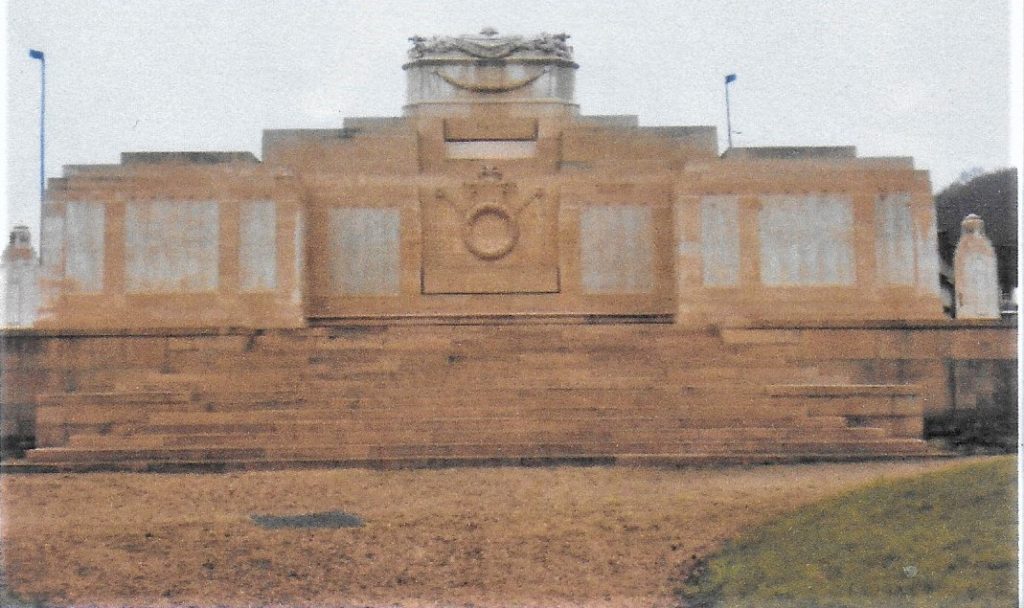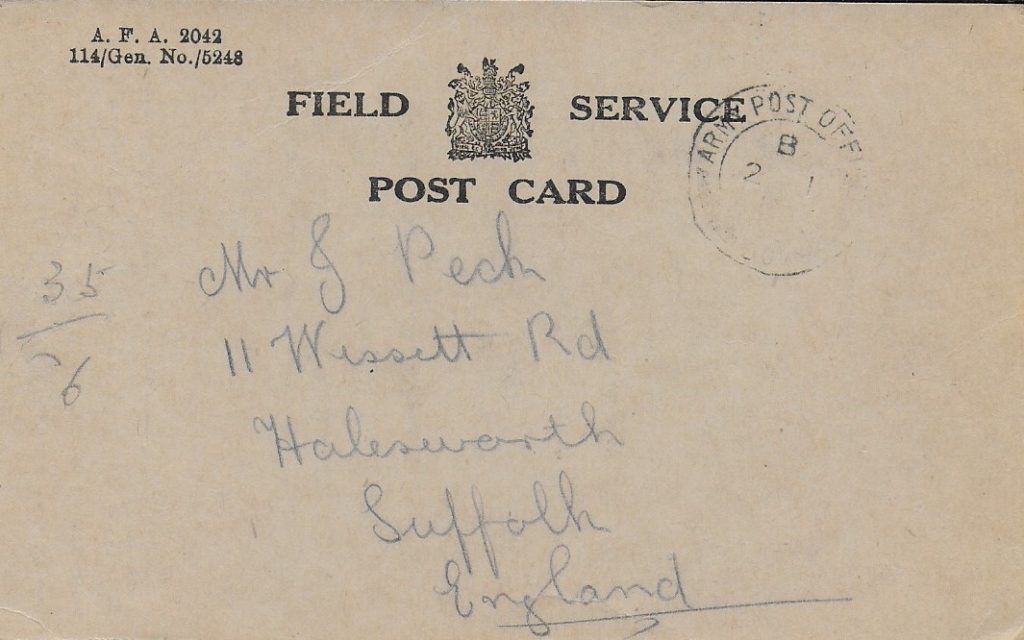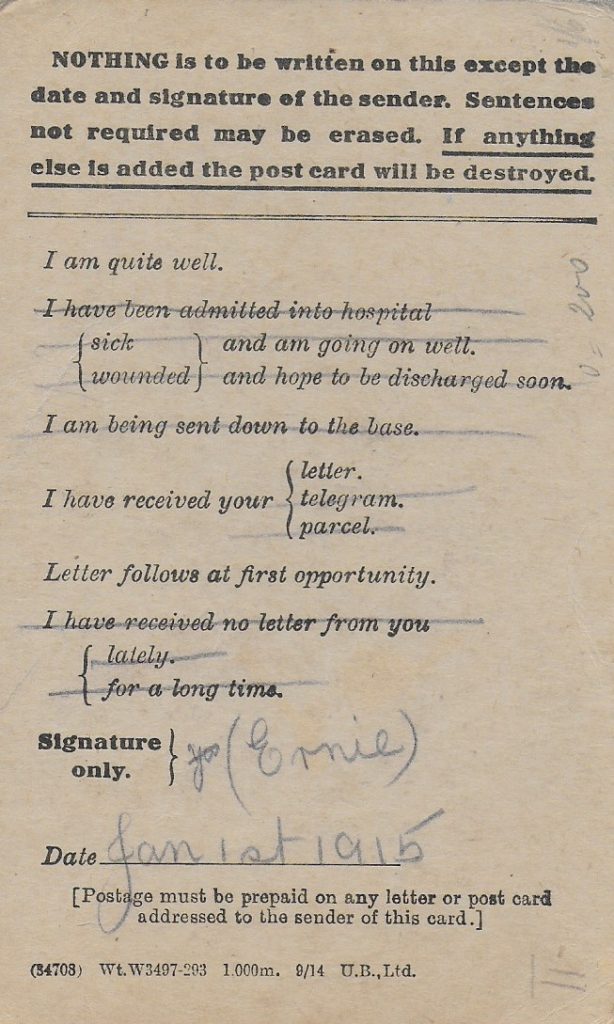8094 PRIVATE SAMUEL GIBSON PECK
1ST BATTALION BEDFORDSHIRE REGIMENT
KILLED IN ACTION
24TH AUGUST 1914
AGE 28 YEARS
Samuel Gibson Peck’s birth was registered in the third quarter of 1886 at the nearby village of Peasenhall, seven miles to the south-west of Halesworth. He was the eighth of twelve children born to James, a one-time corn miller, and his wife Priscilla (née Bentley). By the time of the 1891 census the ever-growing family were to be found living in one of the cottages located at Fenn Farm, Halesworth, moving some time later to 3 Rectory Street. During his formative years Samuel attended the local boy’s school, where on leaving in 1900 he found work as a stable boy and groom in the town. It appears that on reaching the age of eighteen he had, in the language of that time, ‘Taken The King’s Shilling’ by enlisting in the Regular Army, becoming 8094, a Private Soldier in the Bedfordshire Regiment. As with the vast majority of those men who died during World War One, his military records have not survived, so it is not possible, with regard to his pre-war service, to identify which of his regiment’s two battalions he had served with and from when. However, from research in to his regimental number, he appears to have enlisted in mid-1904 and then gone on to serve for five years before being discharged to the Army Reserve. Although it cannot be confirmed, it is believed that, while in the army, he had gained a trade in butchery. During the fourth quarter of 1909 Samuel married Blanche Susie Whitby, who hailed from the local village of Yoxford. The census of 1911 found them living in the Costessey area of Norwich with a young son, Robert Samuel, who had been born on 24th December 1910. Samuel’s occupation was listed as that of a journeyman butcher. On 11th February 1912 a second son, Bertie Cyril, was born, but sadly died just six days later. Shortly after their loss the family were on the move once again. On 18th March 1913 the birth of a daughter, Ida Blanche, was registered while they were living in Beccles.
With the outbreak of hostilities in August 1914 one of the first acts of the War Office was to mobilise all those men who remained on the Reserve List. This, no doubt, required Samuel to report to the Bedfordshire’s Regimental Depot, situated at Kempston Barracks in the county town of Bedford. From there, along with fellow reservists, he was sent to join the 1st Battalion, at that time travelling from their pre-war base situated at Mullingor in Ireland. Samuel’s medal index card confirms that he landed with his battalion when they arrived in France on 16th August 1914, just twelve days after war had been declared. By any stretch of the imagination the scale of what had been achieved in such a short period of time shows how efficient the system must have been. On their arrival on the Continent the 1st Bedfords were serving in the 15th Brigade of the 5th Division. They were immediately despatched to a rest camp to prepare themselves for war. The following day they were then transported by rail to the small French village of Le Pommerevil, prior to crossing the border into Belgium, after which the battalion split, with A and B companies digging trenches to the front of the village of Wasmes while C and D companies began preparing positions in the neighbouring village of Paturage. The following day, 24th August, the day of Samuel’s death, the detached C and D companies were relieved and re-joined the battalion at Wasmes. It was shortly after their arrival that the German Infantry made their first major attack on the 1st Bedfords’ positions. After a brisk fire fight the enemy were driven back, having suffered many casualties. Four men from the Bedfords were killed, including poor Samuel. Within a very short time the Germans mounted another strong attack against the British line. This time ,with their neighbouring battalions, they had been forced to withdraw. It would have been at this time that Samuel and one of his comrade’s graves were lost, never to be found. They and over three thousand, seven hundred other British troops are now remembered on the La Ferte-Sous-Jouarre memorial to the missing, in the Seine-et-Morne region of France (see above).
The first report of Samuel being listed as missing in action was published in the Halesworth Times of 22nd September 1914, after his wife Blanche had received a telegram at their home in Beccles during the previous week. The article also mentioned that one of Samuel’s brothers, Ernest Gibson Peck, was also serving in France at that time with the Royal Field Artillery (see below). By June 1915 the Ministry of Pensions, now satisfied that Samuel had been killed, awarded Blanche and her two children a weekly pension of 18s 6d (93p) that was then increased to £1.2s.1d (£1.10p) in April 1917. Some three months after her second award, Blanche and her children returned to live in the West Wymer district of Norwich, where she married a widower, Joseph Southey, a boot finisher, on 4th July 1917. The final payments made to Blanche in regard to the loss of Samuel were made on 10th July 1919 when she received the second of two gratuities that totalled £6.8s.9d (£6.44p).
In addition to the monetary awards granted to his wife she would also have been entitled to claim her husband’s medal entitlement, which would have consisted of a 1914 Star and Bar trio. The dated bar had only been issued to those who had actually been under fire between 5th August and 22nd November 1914. Those entitled men proudly called themselves ‘Old Contemptibles’ after the German Kaiser’s disparaging description of them as a contemptible little army. Blanche would also have been able to claim Samuel’s named bronze memorial plaque and scroll.
The location of these is unknown.
The original issue Field Service Postcard shown below, was sent to Samuel’s mother, Priscilla, who at that time was living at 11 Wissett Road, Halesworth on 1st January 1915 by his younger brother Ernest, who had enlisted into the Royal Field Artillery in November 1913. He had arrived in France barely three weeks after Samuel and would not have known then of his brother’s death. The Halesworth Times of 15th May 1917 took much pleasure and pride in announcing the award of the Meritorious Service Medal for Bravery to 74306 Corporal Ernest Gibson Peck R.F.A. on the Honours and Awards list of 16th April 1917. An extract of his medal citation is reproduced below.
Under authority granted by His Majesty the King, the Commander-in-chief has been pleased to approve the grant of the Meritorious Service Medal to the undermentioned soldier:- No 74306 Driver (Actg.) Corporal Ernest Gibson Peck, Royal Field Artillery, attached A.O.C.
“During evening air-raid at Railhead on April 8th, 1917, many bombs, one of which was incendiary, having dropped amongst the ammunition park dug-outs, one stack and quadrant of high explosives and 4.5 Howitzer ammunition caught fire. Lieut Donovan, who was looking out of his dug-out, having called for volunteers, Driver Peck immediately rushed to the burning ammunition boxes, and proceeded to put out the fire, although enemy bombs were still falling at the time, and the fire had gained a huge spread over the boxes containing H.E. It was due to Driver Peck’s prompt and gallant action in giving assistance that a serious explosion was averted.”



